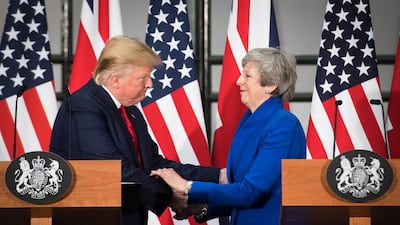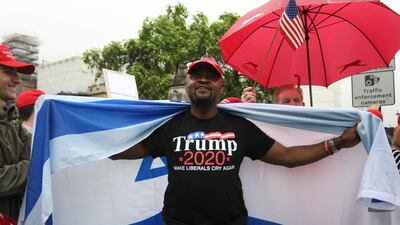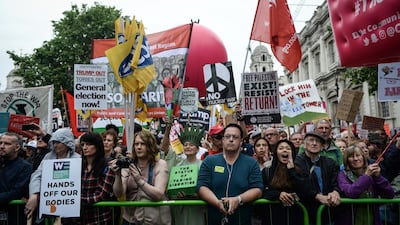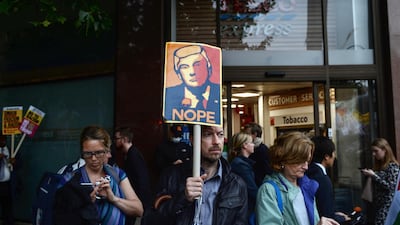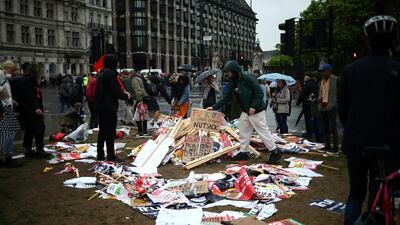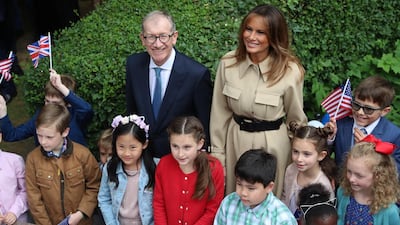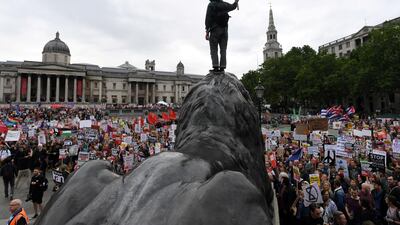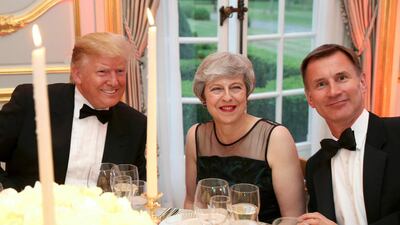Despite increasing criticism from his own party, US President Donald Trump said on Tuesday he would probably go ahead with tariffs on imports from Mexico to force it to clamp down on illegal migrants.
Mr Trump said in London that he expected to impose 5 per cent tariffs on Mexican imports from Monday, because of the high number of mostly Central American immigrants crossing the southern border.
In a last-ditch attempt to find a resolution, a Mexican delegation including Foreign Minister Marcelo Ebrard is set to take part in talks at the White House on Wednesday afternoon, hosted by US Vice President Mike Pence.
Mr Trump is touring Europe to commemorate the anniversary of D-Day.
If the tariffs go ahead, the US will be in a serious dispute with two of its three top trading partners.
US relations with China have worsened in the past month as Washington and Beijing slap more tariffs on each others' imports.
Mr Trump has threatened to increase the tariffs on Mexico to as much as 25 per cent this year if the government does not do more to stop the migrants.
And he warned Republicans in Congress not to block his efforts.
"I don't think they will do that," Mr Trump said. "I think if they do, it's foolish."
But Republican senators said that the White House might not have their backing.
Senate majority leader Mitch McConnell said there was "not much support" among other Republicans for the tariffs.
The threat has unnerved global markets and put in doubt the ratification of a three-way trade pact between the two countries and Canada, which took more than a year to negotiate, in doubt.
The tariffs have also been criticised by the US Chamber of Commerce and industry groups because of concerns about increased costs for American businesses and consumers.
Mexico exports a broad range of goods to the US, ranging from cars and vehicle parts to TVs.
Toyota said on Tuesday that tariffs on Mexican imports could cost the car-maker's major suppliers as much as $1 billion (Dh3.67bn).
Mexican leaders are expected to show White House officials on Wednesday that they are taking steps to stem the flow of migrants, but Mr Trump said the talks might not resolve the issue.
"We're going to see if we can do something but I think it's more likely that the tariffs go on," he said, describing immigrants entering the US illegally as an "invasion."
Mexican President Andres Manuel Lopez Obrador said he was optimistic that a deal on tariffs and migration could be reached.
US Commerce Secretary Wilbur Ross said: "Hopefully, we can work out a sensible solution to the border crisis and minimise the economic fallout."
Battling illegal immigration was one of Mr Trump's main campaign pledges in the 2016 presidential election, and it looks as if it will be a major issue again as he seeks re-election in 2020.
"Mexico should step up and stop this onslaught, this invasion into our country," Mr Trump said on Tuesday.
He also called on the US Congress to pass immigration laws to address the situation and blamed Democrats for stalling them.
The number of people caught on the US-Mexico border each month is at its highest in more than a decade, but it is still lower than at other peak periods since the 1970s.
US authorities are overwhelmed by a shift in the type of people turning up at the border in recent years.
Increasing numbers of Central American families and unaccompanied minors seeking asylum from criminal violence at home have been turning themselves in to US border agents.
The agents have long been prepared up to catch mainly single, adult Mexicans trying to cross illegally.
That has presented new challenges for US officials.
Border authorities caught more than 98,000 people in April, 60 per cent of them in families. Six minors have died while in US custody or shortly after being released.
Mexico is now detaining double the number of migrants a day than a year ago, and three times as many as in January, when Mr Lopez Obrador's new government chose to give visas to Central Americans, hoping they would stay in Mexico.
Instead, most of them made their way to the border, contributing to the recent surge.
Under pressure from the US, the Mexican government changed strategy, and detentions in May surged past 20,000.


